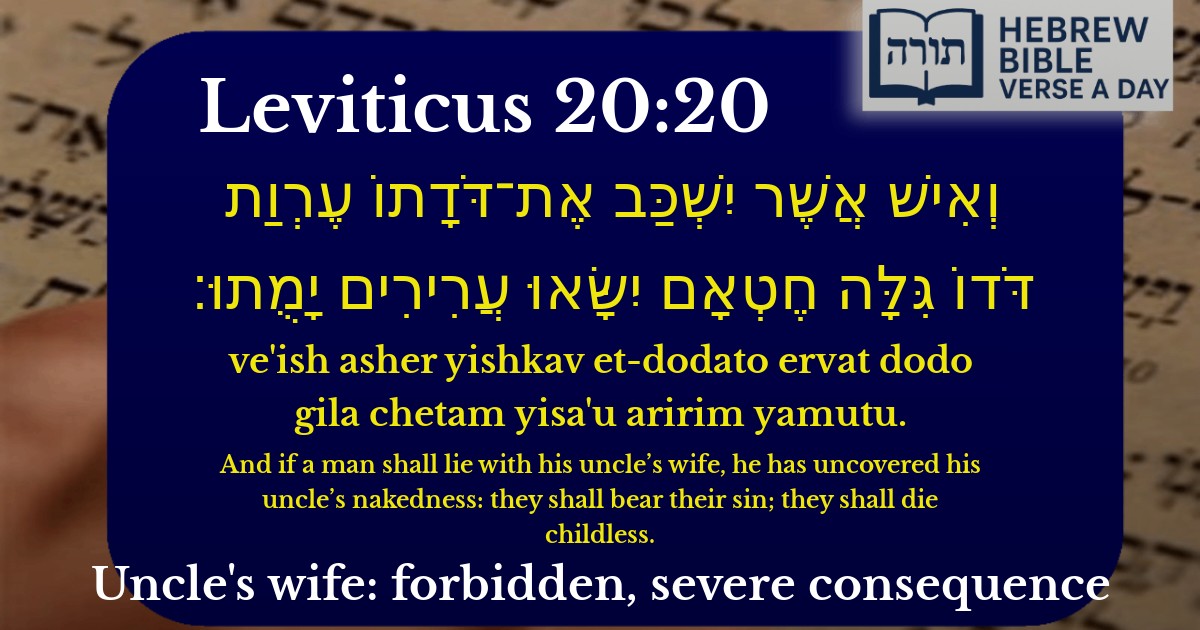Join Our Newsletter To Be Informed When New Videos Are Posted
Join the thousands of fellow Studends who rely on our videos to learn how to read the bible in Hebrew for free!
Hebrew Text
וְאִישׁ אֲשֶׁר יִשְׁכַּב אֶת־דֹּדָתוֹ עֶרְוַת דֹּדוֹ גִּלָּה חֶטְאָם יִשָּׂאוּ עֲרִירִים יָמֻתוּ׃
English Translation
And if a man shall lie with his uncle’s wife, he has uncovered his uncle’s nakedness: they shall bear their sin; they shall die childless.
Transliteration
Ve'ish asher yishkav et-dodato ervat dodo gila chetam yisa'u aririm yamutu.
Hebrew Leining Text
וְאִ֗ישׁ אֲשֶׁ֤ר יִשְׁכַּב֙ אֶת־דֹּ֣דָת֔וֹ עֶרְוַ֥ת דֹּד֖וֹ גִּלָּ֑ה חֶטְאָ֥ם יִשָּׂ֖אוּ עֲרִירִ֥ים יָמֻֽתוּ׃
וְאִ֗ישׁ אֲשֶׁ֤ר יִשְׁכַּב֙ אֶת־דֹּ֣דָת֔וֹ עֶרְוַ֥ת דֹּד֖וֹ גִּלָּ֑ה חֶטְאָ֥ם יִשָּׂ֖אוּ עֲרִירִ֥ים יָמֻֽתוּ׃
🎵 Listen to leining
Parasha Commentary
📚 Talmud Citations
This verse is quoted in the Talmud.
📖 Yevamot 54b
The verse is discussed in the context of the laws regarding forbidden relationships, specifically the prohibition of lying with one's uncle's wife.
📖 Sanhedrin 83a
The verse is referenced in a discussion about the punishments for various sins, including the consequences for engaging in forbidden relationships.


Prohibition of Relations with an Uncle's Wife
The verse (Vayikra 20:20) prohibits a man from engaging in relations with his uncle's wife, referring to this act as "uncovering his uncle’s nakedness." This prohibition is one of the arayot</em (forbidden relationships) listed in the Torah, carrying severe consequences.
Explanation of the Sin
Rashi explains that the phrase "עֶרְוַת דֹּדוֹ גִּלָּה" ("he has uncovered his uncle’s nakedness") indicates that this act is considered a violation of familial boundaries, akin to dishonoring one’s uncle. The Rambam (Hilchot Issurei Biah 1:6) classifies this prohibition as a lav (negative commandment) punishable by karet (spiritual excision) if done intentionally.
Consequences: "They Shall Bear Their Sin"
The phrase "חֶטְאָם יִשָּׂאוּ" ("they shall bear their sin") implies that both the man and the uncle’s wife are held accountable. The Talmud (Sanhedrin 54a) discusses whether this refers to a court-imposed death penalty or divine punishment. Some opinions hold that this sin is punishable by sekilah (stoning), while others argue it refers to karet.
Meaning of "עֲרִירִים יָמֻתוּ" ("They Shall Die Childless")
The punishment of dying childless is interpreted in multiple ways:
Broader Context in Jewish Law
This prohibition is part of a larger framework in parashat Kedoshim (Vayikra 18-20), which emphasizes holiness in interpersonal relationships. The Ramban notes that these laws distinguish the Jewish people as a nation committed to moral purity. The severity of the punishment underscores the Torah’s emphasis on maintaining proper familial and societal boundaries.